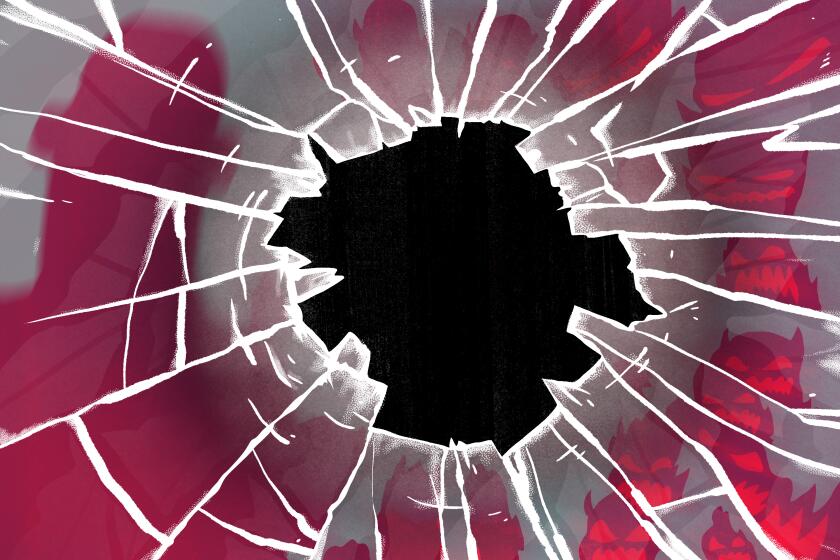Opinion: I treat schizophrenia. It’s getting hard to distinguish its delusions from our current digital reality

- Share via
I have been running a day treatment program for individuals with schizophrenia for nearly seven years. Schizophrenia is an often life-altering psychiatric condition that is characterized by profound changes in cognition, perception and emotional expression. Among the core symptoms are delusional thoughts, currently defined by the Diagnostic and Statistical Manual of Mental Disorders, or DSM-5, as “fixed beliefs that are not amenable to change in light of conflicting evidence.”
To try to determine the extent to which my patients feel monitored, persecuted or invaded, I ask them variations on the same questions each week. Over the past several years, as the insidious impact of the digital world on the psyche has become more obvious to me, I have had to modify my questions to reflect our current reality.
Are you able to use the internet? Do you avoid it for any reason? Have you changed your cellphone number or replaced your mobile device over the past year? Do you receive strange messages through social media? Are famous people posting about you? Are there any online conspiracies that are targeting you?
The life of a 31-year-old living with schizophrenia illustrates the toll of illness and the challenge of getting severely mentally ill people off the streets.
The first report of a case of “systematized delusions involving the internet” was published in 1997. It contained a description of a “Mr. D” who was “brought to the hospital because he believed that his life was controlled by the internet.” He spent “long intervals on the computer” and had become concerned that he was seeing evidence of “double-talk” in what he read and that a neighbor was “putting information about his life” online.
Reading the tale of Mr. D now is like peering through a long, narrow tunnel back to the retrospectively quaint last decade of the 20th century. He is “patient zero,” the first in what is now a large and growing body of literature documenting delusions involving the internet and supporting technologies. This is unsurprising, given the decades of research showing how emerging cultural, social and political themes — the rise of rock ’n’ roll, the fall of the Berlin Wall, North Korea’s development of nuclear weapons — repeatedly become incorporated into delusional frameworks.
A person who develops delusional thoughts may find confirmation of these thoughts online. If I believe that I am being secretly recruited by the Central Intelligence Agency, I may then determine that unsolicited marketing emails are in fact coded messages. If I believe my neighbors are plotting against me, I may start to suspect they have hacked my Wi-Fi network.
Conversely, the internet can serve as the source of a delusional framework. I may begin to see that celebrities on my social media feed are publishing posts that seem created just for me, leading me to believe that I have special powers. An advertisement that appears in my search engine results may have been placed there by a government agency.
Our son has schizoaffective disorder with depressive episodes. He was arrested in L.A. for breaking windows, jailed, found competent and released pending a court date. Things did not go well.
More and more I find myself twisting into cognitive and linguistic pretzels, trying to help my patients (and myself) determine where we draw the line between psychosis and reality. In response to my query about whether he uses the internet, one patient responded, “Do I use the internet, or does the internet use me?” Well, there is truth in both statements, and one would need a more sophisticated knowledge of government and corporate monitoring, surveillance capitalism and artificial intelligence to determine the extent to which we humans still retain our agency over computers.
When we are discussing social media platforms and my patients tell me that “the algorithm is hacked,” I cannot help but agree. Yes, it is true: Your phone is listening to you, the camera on your laptop is watching you and the advertisements you see online are predicting what you will buy and the websites you will want to browse.
I have met patients who have fallen deeply down the rabbit hole of online conspiracy theories, and eventually these theories bleed into their nonvirtual lives and cause them to take actions they otherwise would not have taken. I try to help them return to regular life, with a job and relationships that are not based on a digital platform.
Psychiatrists used to distinguish between delusions that were “bizarre,” or impossible, and those that were “non-bizarre,” or possible but false. The DSM-5 no longer makes this distinction, in part because people do not reliably agree with each other when it comes to determining what is “possible” or “impossible.” And as our technology advances at an astonishing pace, what was unthinkable yesterday may in fact be plausible today.
Defining a delusion as a belief that is not amenable to change in light of conflicting evidence requires that we have a shared understanding of what is “truth” and how it is determined. As the internet makes our collective truth harder and harder to define, I find myself increasingly lost in the shifting boundary between my patients’ reality and my own.
Alaina Burns is a psychiatrist and an assistant clinical professor in the adult psychiatry division at UCLA’s David Geffen School of Medicine.
More to Read
A cure for the common opinion
Get thought-provoking perspectives with our weekly newsletter.
You may occasionally receive promotional content from the Los Angeles Times.












